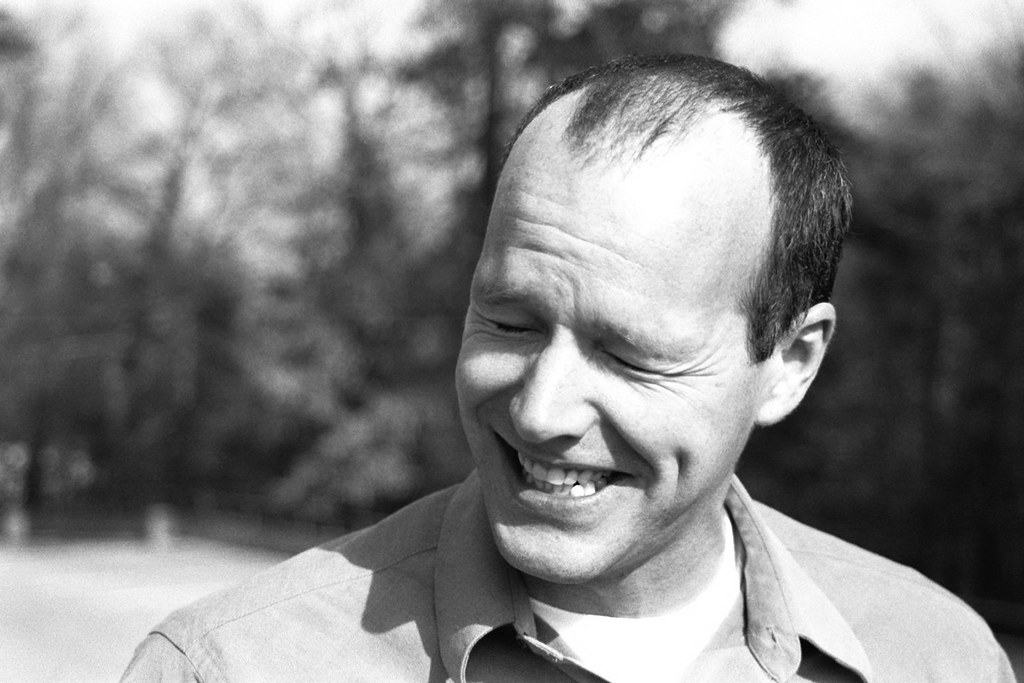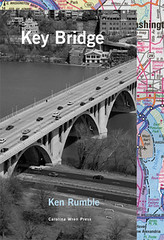Reading Wrap-Up, Reviews, and Some Updates
Once again, an inspiring, passionate, delightful performance from the two readers Saturday night: Cole Swensen and Chris Vitiello. Some surprising similarities between them, most obvious in their interest in contemporary French poets and more subtly in the ideas that brought them to those French writers (Hocquard, Cadiot, Albiach, etc.) in the first place. In a field that demands creativity, Chris is one of the most creative poets I've had the pleasure to meet. He made a little chapbook/activity book, projected a film loop made of words written onto super 8 film, projected light through a baking dish and several fish, and read two works: one a roller coaster of a sales pitch and the other sections of his manuscript Irresponsibility. Cole read some work from a forthcoming book that revolves around hands and metaphors for hands (I believe the title is The Book of a Hundred Hands?), from a manuscript about formal gardens which is still in the revision stage, and lastly a piece from her most recent book, Goest. Cole is one of the most intelligent and compassionate writers I've read; the power and range of her intellect is like that of Susan Howe, and Swensen combines that with, what I read, as a deep belief in the beauty, value, and potential of humanity. Great poems, and she reads them very well. It was an incredible visit I'm sure we'll all be talking about for a long time.
So a couple reviews have turned up of the reading: one is by Marcus Slease that can be found here.
The other is by Mike Snider and can be found here.
Thanks, Mike & Marcus!
A couple of quick updates before I close with the introduction I put together for Chris and Cole: Lance Phillips unfortunately has had to cancel his plans to come read with Lisa Jarnot in the Desert City in April. Fortunately, Andrea Selch has agreed to step into his place.
Speaking of Lisa's reading, we've set a tentative (mostly solid) date: it will be Saturday, April 23rd. Jarnot is appearing with the help of the John Hope Franklin Center; thanks, Duke University. She will be giving a lecture at Duke on Friday the 22nd. I'll post details.
The last and final reading of the year will feature Lee Ann Brown and Carl Martin. We have a tentative (mostly solid) date for that as well: Saturday, April 30th.
Lastly, the date of the next Carrboro Poetry Festival is drawing nigh. The dates will be May 21st and 22nd. The CPF was an incredible event last year, set the bar very high. This year won't disappoint either I'm sure. Stay tuned for details.
So thanks everyone for coming on Saturday, thanks Chris and Cole, and see you all again on March 19th for Brian Henry and Tara Rebele.....
Cole Swensen and Chris Vitiello Into
1. Announcements and welcome
a. Tonight: the Blue Door w/ Evie Shockley
b. Friday, March 18th, the next Durham 3 event at Ooh-la-latte at 7:30 or so. In addition to other folks Randall Williams and I will be reading and performing poems.
c. Next Desert City reading Saturday, March 19th, at 8pm, at the Internationalist. This reading will feature Tara Rebele author of I am Not Jenny and Brian Henry a veteran of last year’s Carrboro poetry Festival, author of three collections of poems, and editor of Verse Magazine.
d. The second Desert City reading in March will be Saturday the 26th at 8pm at the Internationalist. It will feature Patrick Herron, Carrboro’s own Poet Laureate and author of The American Godwar Complex; and Kent Johnson author of The Miseries of Poetry, and a finalist for the 2002 PEN Award in Translation, and recent winner of an NEA Fellowship for Translation.
2. Welcome
a. Thanks for coming
b. introduce yourself
c. The Desert City is a non-profit, volunteer run and funded organization. Both of the poets tonight are appearing without receiving any compensation. Please make a donation to support the poets and the series. Please buy books to support the internationalist.
d. Sign up sheet in the back for announcements of future events
3. Thanks yous
a. The Internationalist
b. Cole and Chris
c. all of you
d. my parents
e. Violet
f. Kathryn
4. Tonight though we are here to see Chris Vitiello and Cole Swensen.
5. In The Nature of Things, Francis Ponge asks, “What is the nature of man?” He answers, “Language and Morality.” Few poets are as dedicated to that exploration of the moral use and consequence of language as one of tonight’s readers and my dear friend Chris Vitiello.
6. In Vitiello’s poems, language use is fundamentally a moral question. At its root, language is a lie; the word chair is obviously not a chair. So what, though, does the word chair create? make happen? Is it morally right to accept the falsehood loitering within every word? Questions like these guide Vitiello’s examination of language and morality. By pushing words and phrases that we normally take for granted to their rational ends, he attempts to find language which has an absolute relationship to the thing it represents. What he most often shows us is the uncanny and surreal world that lurks and is created by our words.
7. He writes in Irresponsibility, “Am I supposed to write that it rained? // One, two, three, four, five, six // What rained?”
8. Chris Vitiello lives in a plum colored house in Durham with Vicki and Iris Vitiello. He is the author of Nouns Swarm a Verb published in 1999 and was a founding editor of one of the 90s most highly esteemed literary journals, Proliferation. He earned an Master of Fine Arts degree from the Naropa Institute in Boulder, Colorado. He is currently a member of the Lucifer Poetics Group and the head, though he will deny it, of a poets’ theatre group called The Theatre of Consecutive Thinking. His range of interests and projects is too long to list but they include home repair, automatic flip clocks, Marcel Duchamp, pin-hole photography, bird watching, letterpress printing, Romanian folk music, modern dance, cinematography, the work of Matthew Barney, cooking, and a semi-annual writers’ retreat called “working vacation.”
9. Vitiello’s most recent poetic project is a work titled Irresponsibility. The question that predicates the book is whether or not the writing of poems is a morally responsible act. From this question, he turns his intellect to consider the way language and poems represent nature, human relationships, poetry, art objects, and language itself, how, finally, language reveals only itself.
10. Like language, “The coverage of the taxi explosion / shows the exploded taxi” and “To see the wind I look at a tree” and “You shouldn’t have to fight boredom” and “Writing this erases what it actually is” and “I see this: The puddle’s reflection of trees against sky repeatedly jitters and stills / I say this: ‘It is raining.’”
11. His quest is always to find something real in language, to find something other than words below words. In this drive, Vitiello is a sort of a rational mystic and poems serve as a set of instructions to guide himself and his readers to actual life beyond the page. He writes, “This is a poem / The poem happens outside the poem // Poems happen outside / poems / //Poems aren’t / poems.”
12. It is not clear if it is possible, in these poems, to escape the endless and fantastic maze that our words make for our minds, because of course, we can only describe the means of that escape with more words.
13. Vitiello writes, “The car is smoking / I knew / the car smokes / All you have to do is pay attention and it’s not that simple.”
14. Please welcome Chris Vitiello.
15. “The world is beautiful and now it is a single thing and this renders it silent so that the light can pass through in any direction, altering the nature of motion, and everything that moves is newly legible though unsayable; one said it would be possible but another turned around quickly and is still turning.”
16. The unsayable, the indescribable, the world beyond words, without terms: the paradox of describing beauty so profound that it is beyond description: this is the territory Cole Swensen seeks to enter in her poems, as a geographer of unspeakable wonder.
17. “There is indeed the unspeakable, and it can’t show itself; this is the real.”
18. A finalist for the National Book Award in 2004, the author of nine collections of poetry, a translator of contemporary French poets, winner of at least five other prestigious literary awards, member of the Iowa Writers’ Workshop faculty, and political activist.
19. “Landscape is light alone. Some white coming up from behind which like a pendulum will come to entrance” and “I saw someone leaving / and I saw the world, which was meant only for background, come to life” and “into the blazing city // that all the white boats are leaving, a city sailing / into ages, please repeat: // 1) The city is white / 2) Most cities are white / 3) The white thing you see if you turn around quickly // often far away, often far out to see, though at time across a plain, a shimmer, or as if silt falling, fine-grained, a counting sand, a seed well-timed”
20. Light, in these poems, is our teacher, is that which makes everything possible. Light as an ally, the unifier; lighting, lightning, the state to which Swensen asks us to aspire.
21. “Land becomes art through applied joy and shock” and ““The natural extension of the hand / is the world is / reflected in its proper motion.”
22. Humanity in its highest state: the world and of the world. The poems uncover the work of painters, inventors, scientists, philosophers, the moments when we reach into the real, unsayable world and bring something back into life.
23. “Walking unravels the muscle that connects / the earth to bone, / feathers it out like a braid unskeined, / the leaves never fall straight down, even / when you think not one bit of air is moving” and “Philolaus the Pythagorean who believed / the sun a vitreous body / oddly / built of cast-off centuries with all their pictures in place” and “Poussin: the angel is still there but Joseph looks back at her in fear while Mary simply looks back and the child, simply, at us. Behind it all, an impossibly intricate world that turns the sun blue.”
24. Humanity, in these poems, as the recipient, creator, and beneficiary of beauty of creation, humanity in the singular.
25. “Face after face across this expanse. Extend and turn. If you turned around you’d be facing a forest” and “the face that underlies a landscape is only perceptible from a train. Einstein knew this and ‘the world has a face that looks back at you, and it is your own.’”
26. Cole Swensen is a humanist, a historian and celebrant of human achievement, an archeologist of the undeniable, inevitable recurrence of beauty in us and in the world.
27. “We begin with the proposition that the world is beautiful” and ““You can now see the world as a single streak, something built of transparent speed; pure white of the sort they say no one person, unaided, can perceive.”
28. Please welcome Cole Swensen.



0 Comments:
Post a Comment
<< Home